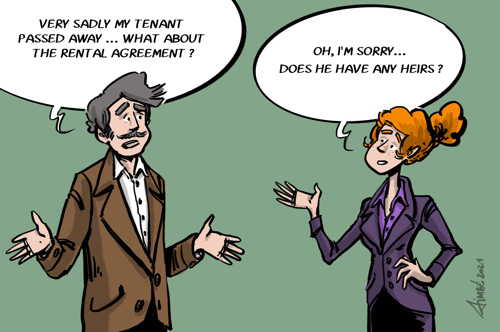- Real Estate, Renting and Co-ownership
- tenant , lease agreement , death of a tenant , without heirs , end of a lease agreement , termination of a lease agreement , tenancy agreement , rental property , rental guarantee , residential lease
If your tenant dies without leaving any heirs or without the heirs accepting the inheritance, what to do as landlord to get your rental property vacated and what about the contents present in the property and the rental guarantee provided?
Recently, these rules became of regional competence and are therefore different for each region. Please find below a brief overview.

1. Does the death of your tenant mean the end of the lease agreement?
Depending on whether a lease agreement was entered into before or after 1 January 2019, the federal or regional regulations apply.
1.1 The lease was entered into before 1 January 2019 - federal legislation
For residential leases entered into before 1 January 2019, federal law continues to apply. And this federal law does not provide for an automatic termination of the lease.
If there are no heirs or the heirs reject the inheritance, then after a period of 3 months and 40 days (period for drawing up the inventory of the estate and for considering whether to accept or reject the inheritance) the estate will be considered to be unattended.
After this, the court of first instance will appoint a receiver with the task of managing and liquidating the estate. The receiver will have to terminate the lease and empty the premises. This procedure can sometimes take a long time.
1.2 The tenancy agreement was entered into after 1 January 2019 - regional legislation
If your tenant dies, first check in which region the property is located. Depending on this, the Flemish decree, the Brussels decree or the Walloon decree will apply.
But one thing is certain, the regional regulations all provide that the tenancy agreement will automatically terminate after the tenant's death.
2. What about the terms, contents and rental guarantee if there are no heirs?
2.1 Flemish Housing Tenancy Decree
The Flemish Housing Tenancy Decree states that the lease agreement is automatically terminated upon the death of the tenant at the end of the second month following his death.
In this case, an additional payment of one month's rent is due to the landlord.
If there are still some movable goods present in the premises, the landlord has no other choice but to submit a unilateral request to the competent justice of the peace. The justice of the peace will then come and draw up an official report with a description of the contents of the premises. In these report, the justice of the peace will also appoint a receiver who will be responsible for the eviction of the property. Once the receiver has sold the household contents, his mandate ends.
The justice of the peace will then decide on the allocation of the realised assets.
As lessor, it is advisable to request the release of the rental guarantee in the same unilateral request.
2.2 Brussels ordinance on the housing lease
The Brussels ordinance states that the tenancy agreement is terminated by operation of law upon the death of the tenant if two cumulative conditions are met, namely (1) the leased premises remain unoccupied after the death; (2) the rent and/or charges have not been paid for more than two months.
In the Brussels Capital Region, neither a notice period nor a compensation in lieu of notice is provided for.
If the above two conditions are met and the property still has its contents, the landlord can freely dispose of the property from the moment of termination. As a lessor, you must comply with the rules of consignment of goods.
In order to obtain the release of the rental guarantee, it is recommended, as landlord, to submit a unilateral request to the competent justice of the peace.
2.3 Walloon Housing Decree
The Walloon Decree makes a distinction between non-furnished and furnished premises:
- If the premises are unoccupied and unfurnished after the death of the tenant, the lease will be terminated by operation of law three months after the tenant's death.
An exception to this is when the landlord has the vacancy established by a bailiff at his own request or at the request of the competent justice of the peace, before whom the case is brought on a unilateral request. In this case, the lease agreement will end by operation of law without notice or compensation on the date of the bailiff's assessment, and thus possibly before the period of three months has expired. - If the property is unoccupied but furnished after the death of the tenant, the lease agreement will be dissolved by operation of law within three months after the death of the tenant. As soon as a bailiff has drawn up an inventory of the goods present in the property, you, as landlord, will be able to dispose of them with due care and sell them.
The procedure for obtaining release of the rental guarantee has to be instituted by unilateral request as in the Flemish and Brussels Capital Regions.
2.4 Federal legislation in the event of a tenancy agreement concluded before 1 January 2019
In this respect, we refer to the point 1.1.
3. Conclusion
After the regionalisation of the residential leases, there is more certainty for landlords regarding the end of the lease upon the death of their tenant.
If the tenant has no heirs or the heirs have rejected the inheritance, the landlord will still have to take steps to remove the furniture from the property, depending on the region in which the property is located.
With regard to the rental guarantee, the legislation is more uniform. In all three regions, landlords must submit a unilateral request to the competent justice of the peace.




